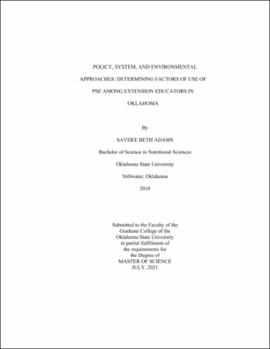| dc.contributor.advisor | Hildebrand, Deana | |
| dc.contributor.author | Adams, Saydee Beth | |
| dc.date.accessioned | 2022-05-13T19:05:08Z | |
| dc.date.available | 2022-05-13T19:05:08Z | |
| dc.date.issued | 2021-07 | |
| dc.identifier.uri | https://hdl.handle.net/11244/335756 | |
| dc.description.abstract | Background: A nation-wide focus on Policy, Systems, and Environmental (PSE) strategies has emerged as a complimentary approach to individual based strategies for obesity prevention. PSE changes are community-based strategies that aim to create environments that facilitate healthy eating and physical activity to support obesity prevention. The efforts are often planned and implemented through collaborative efforts with agencies, such as Cooperative Extension and community partners. The extent to which Oklahoma Cooperative Extension Educators use PSE strategies in their communities as well as the factors that affect their intention to carry out PSE strategies is not known. | |
| dc.description.abstract | Objective: To determine the extent to which Extension Educators perceive obesity as a problem in their community and identify factors that influence Extension Educators' intentions to use PSE strategies as an approach to address public health issues. | |
| dc.description.abstract | Design: The cross-sectional study used a 66-item online survey administered to Oklahoma State University Extension Educators in the 4 areas of Family and Consumer Sciences, Nutrition Education Assistants, 4-H Educators, and Agriculture Educators. | |
| dc.description.abstract | Results: The Extension Educators identified obesity, diabetes, and heart disease as public health concerns. Three of the four identified contributing factors were environmental in nature, including availability of fatty and sugary foods, TV/screen time, perceived price of healthy food, and lack of nutrition knowledge/skill. The key components identified in the present study were Extension resources, Educators' attitudes and beliefs reflecting outcome expectancy of using PSE strategies, and networking with community agencies and organizations. These components are constructs of the Theory of Planned Behavior including Perceived Control, Attitudes and Beliefs, and Networking (social norms). | |
| dc.description.abstract | Conclusion: Findings from this study provide insight to factors related to Oklahoma Extension Educators' intent to use PSE approaches. The findings will be used to develop a second survey that will be applicable specifically for Oklahoma Extension Educators to identify if intentions differ between groups of educators, which will inform development of PSE training and technical assistance. | |
| dc.format | application/pdf | |
| dc.language | en_US | |
| dc.rights | Copyright is held by the author who has granted the Oklahoma State University Library the non-exclusive right to share this material in its institutional repository. Contact Digital Library Services at lib-dls@okstate.edu or 405-744-9161 for the permission policy on the use, reproduction or distribution of this material. | |
| dc.title | Policy, system, and environmental approaches: Determining factors of use of PSE among extension educators in Oklahoma | |
| dc.contributor.committeeMember | Joyce, Jill | |
| dc.contributor.committeeMember | Hermann, Janice | |
| dc.contributor.committeeMember | Gabel, Candy | |
| osu.filename | Adams_okstate_0664M_17052.pdf | |
| osu.accesstype | Open Access | |
| dc.type.genre | Thesis | |
| dc.type.material | Text | |
| dc.subject.keywords | cooperative extension | |
| dc.subject.keywords | obesity prevention | |
| dc.subject.keywords | oklahoma | |
| dc.subject.keywords | policy | |
| dc.subject.keywords | system | |
| dc.subject.keywords | and environmental | |
| dc.subject.keywords | pse approaches | |
| thesis.degree.discipline | Nutritional Sciences | |
| thesis.degree.grantor | Oklahoma State University | |
